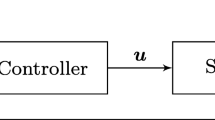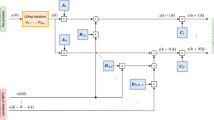Abstract
This paper proposes an approach for reducing the computational complexity of a model-predictive-control strategy for discrete-time hybrid systems with discrete inputs only. Existing solutions are based on dynamic programming and multi-parametric programming approaches, while the one proposed in this paper is based on a modified version of performance-driven reachability analyses. The algorithm abstracts the behaviour of the hybrid system by building a ’tree of evolution’. The nodes of the tree represent the reachable states of a process, and the branches correspond to input combinations leading to designated states. A cost-function value is associated with each node and based on this value the exploration of the tree is driven. For any initial state, an input sequence is thus obtained, driving the system optimally over a finite horizon. According to the model predictive strategy, only the first input is actually applied to the system. The number of possible discrete input combinations is finite and the feasible set of the states of the system may be partitioned according to the optimization results. In the proposed approach, the partitioning is performed offline and a probabilistic neural network (PNN) is then trained by the set of points at the borders of the state-space partitions. The trained PNN is used as a system-state-based control-law classifier. Thus, the online computational effort is minimized and the control can be implemented in real time.
Similar content being viewed by others
References
Baotić, M., Christophersen, F.J., Morari, M.: A new algorithm for constrained finite time optimal control of hybrid systems with a linear performance index. In: European Control Conference. University of Cambridge, 2003
Barton, P.I., Banga, J.R., Galán, S.: Optimization of hybrid discrete/continuous dynamic systems. Comput. Chem. Eng. 24, 2171–2182 (2000)
Bemporad, A.: Efficient conversion of mixed logical dynamical systems into an equivalent piecewise affine form. IEEE Trans. Automat. Contr. 49(5), 832–838 (2004)
Bemporad, A., Giovanardi, L., Torrisi, F.D.: Performance driven reachability analysis for optimal scheduling and control of hybrid systems. In: Proceedings of the 39th IEEE Conference on Decision and Control, pp. 969–974. IEEE, Sydney (2000)
Bemporad, A., Morari, M.: Control of systems integrating logic, dynamics, and constraints. Automatica 35(3), 407–427 (1999)
Bemporad, A., Morari, M.: Optimization-based hybrid control tools. In: Proceedings of the American Control Conference, pp. 1689–1703. IEEE, Arlington (2001)
Bemporad, A., Morari, M., Dua, V., Pistikopoulos, E.N.: The explicit linear quadratic regulator for constrained systems. Automatica 38(1), 3–20 (2002)
Bemporad, A., Torrisi, F.D., Morari, M.: Optimization-based verification and stability characterization of piecewise affine and hybrid systems. In: Hybrid systems: Computation and Control, Lecture Notes in Computer Science, vol. 1790, pp. 45–58. Springer, New York (2000)
Borrelli, F.: Constrained optimal control of linear and hybrid systems. In: Lecture Notes in Control and Information Sciences, vol. 290. Springer, New York (2003)
Borrelli, F., Baotić, M., Bemporad, A., Morari, M.: An efficient algorithm for computing the state feedback solution to optimal control of discrete time hybrid systems. In: Proceedings of the American Control Conference, pp. 4717–4722. Denver, 2003
Borrelli, F., Baotić, M., Bemporad, A., Morari, M.: Dynamic programming for constrained optimal control of discrete-time linear hybrid systems. Automatica 41(10), 1709–1721 (2005)
Cassandras, C.G., Pepyne, D.L., Wardi, Y.: Optimal control of a class of hybrid systems. IEEE Trans. Automat. Contr. 46(3), 398–415 (2001)
Dua, V., Bozinis, N.A., Pistikopoulos, E.N.: A multiparametric programming approach for mixed-integer quadratic engineering problems. Comput. Chem. Eng. 26(4–5), 715–733 (2002)
Ferrari-Trecate, G., Cuzzola, F.A., Mignone, D., Morari, M.: Analysis of discrete-time piecewise affine and hybrid systems. Automatica 38(12), 2139–2146 (2002)
Gokbayrak, K., Cassandras, C.G.: A hierarchical decomposition method for optimal control of hybrid systems. In: Proceedings of the 38th IEEE Conference on Decision and Control, pp. 1816–1821. Phoenix, 1999
Hedlund, S., Rantzer, A.: Optimal control of hybrid systems. In: Proceedings of the 38th IEEE Conference on Decision and Control, pp. 3972–3976. Phoenix, 1999
Heemels, W.P.M.H., De Schutter, B., Bemporad, A.: Equivalence of hybrid dynamical models. Automatica 37(7), 1085–1091 (2001)
Kerrigan, E.C., Mayne, D.Q.: Optimal control of constrained, piecewise affine systems with bounded disturbances. In: Proceedings of the 41st IEEE Conference on Decision and Control. Las Vegas, Nevada, USA (2002)
Lincoln, B., Rantzer, A.: Optimizing linear system switching. In: Proceedings of the 40th IEEE Conference on Decision and Control, pp. 2063–2068. Orlando, 2001
Morari, M., Baotic, M., Borrelli, F.: Hybrid systems modeling and control. Eur. J. Control 9(2–3), 177–189 (2003)
Pepyne, D.L., Cassandras, C.G.: Optimal control of hybrid systems in manufacturing. Proc. IEEE 88(7), 1108–1123 (2000)
Potočnik, B., Bemporad, A., Torrisi, F.D., Mušič, G., Zupančič, B.: Hysdel modeling and simulation of hybrid dynamical systems. In: 4th MATHMOD Vienna, Proceedings (ARGESIM Report, no. 24). Vienna University of Technology, Vienna (2003)
Potočnik, B., Bemporad, A., Torrisi, F.D., Mušič, G., Zupančič, B.: Hybrid modelling and optimal control of a multiproduct batch plant. Control Eng. Pract. 12(9), 1127–1137 (2004)
Potočnik, B., Mušič, G., Zupančič, B.: A new technique for translating discrete hybrid automata into piecewise affine system. Math. Comput. Model. Dyn. Syst. 10(1), 41–57 (2004)
Rantzer, A., Johansson, M.: Piecewise linear quadratic optimal control. IEEE Trans. Automat. Contr. 45(5), 629–637 (2000)
Sontag, E.D.: Nonlinear regulation: the piecewise linear approach. IEEE Trans. Automat. Contr. 26(2), 346–358 (1981)
Specht, D.: Probabilistic neural networks. Neural Netw. 3, 109–118 (1990)
Torrisi, F.D., Bemporad, A.: HYSDEL—a tool for generating computational hybrid models. IEEE Trans. Control Syst. Technol. 12(2), 235–249 (2004)
Author information
Authors and Affiliations
Corresponding author
Rights and permissions
About this article
Cite this article
Potočnik, B., Mušič, G., Škrjanc, I. et al. Model-based Predictive Control of Hybrid Systems: A Probabilistic Neural-network Approach to Real-time Control. J Intell Robot Syst 51, 45–63 (2008). https://doi.org/10.1007/s10846-007-9180-7
Received:
Accepted:
Published:
Issue Date:
DOI: https://doi.org/10.1007/s10846-007-9180-7




